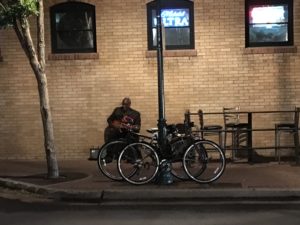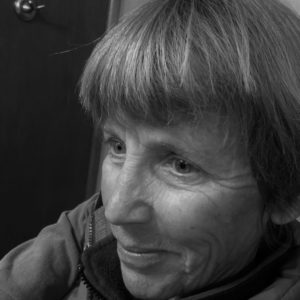 I don’t know if you remember Flagstaff in the late ‘70s. I was a newcomer here, living out in the wilderness of Doney Park. I shared a bungalow with an attorney who worked in town, and in the field next door lived two horses, one white, one gray. I was quite the romantic and named the white one Pure Thought, a name I also bestowed on my white truck. We all named our vehicles back then and many of us still do, possibly in the absence of children.
I don’t know if you remember Flagstaff in the late ‘70s. I was a newcomer here, living out in the wilderness of Doney Park. I shared a bungalow with an attorney who worked in town, and in the field next door lived two horses, one white, one gray. I was quite the romantic and named the white one Pure Thought, a name I also bestowed on my white truck. We all named our vehicles back then and many of us still do, possibly in the absence of children.
In every season but deep winter—and our winters were memorably deep—I slept outside on the ground near the fenceless horse pasture and was awakened at night by the whisper of horse breath on my face. For some reason I never feared being stepped on by those hooves in the dark. I never feared coyotes though I often heard them yipping in the cinder hills not far away. More than once the scream of a mountain lion tore the air in two, a sound so like a human female in distress I don’t know why it didn’t send me indoors. I was fearless, which came with youth, and I was happy to live where the sky was bright and available and the sound of traffic didn’t exist and people, when I came across them, seemed friendly. For someone who grew up in New York City, in a 10th-floor apartment on Lexington Avenue right above the subway line, the Colorado Plateau and Flagstaff in particular offered me a sense of place I had never experienced before. Wide was a word I kept using, not just about the quality of light and darkness, not just about the enormity of the plateau’s natural features or the sinuous beauty of its many canyons and not just about the everyday encounters with cultures congruous to this landscape, whose words for home were many and intricate.
I came here from away and where I landed, to those I left behind, is elsewhere. I’ve heard them say it—with a capital e, as if it’s an incorporated town of its own: Elsewhere. Whether I believed it or not, I came to get something more than to give something, which made me little different than the pioneers, hustlers, carpetbaggers and Indian killers who came before me. I was born in New York City and it never did suit me, so I set out to find a piece of geography that did. I never thought twice about it. I would never have called it wrong. But what I do see now is that if we’re not careful, if we pay no attention to the better angels of our nature as Abraham Lincoln implored us to do, we may spend our lives trading one Elsewhere for another. If we continue to want to get more than we give; if we continue to look around us at the ongoing destruction of our particular Elsewhere, our chosen Elsewhere, not understanding that our presence alone contributes to that destruction, to the degradation and overpopulation of a place once dear to us, we will feel it’s simply time to move elsewhere. And we’ll pack up and head out and begin the cycle again.
I am guilty of dreams of outrunning what is to me one of the English language’s most egregious misnomers: Progress. I moved away from Flagstaff in 1980 to attend graduate school in Iowa, a place with its own beauty but a place I could not call my own. In eastern Iowa the hills roll on down to the Mississippi River, yet I longed for the Colorado and the impressive home it carved for itself northwest of Flagstaff. I came back here in 2000 and was impressed by the choices the people of the city had made—Heritage Square, a downtown that lived and breathed, a dedication to keeping buildings low and the Peaks in sight, a sense of preserving history, a thriving arts scene. Open space was understood as an asset. Controlled growth, optimal use of limited groundwater, celebration of Native cultures, a Center for the Arts. I felt in harmony with the town and that feeling of congruity allowed me to forget that every Elsewhere is vulnerable in equal proportion to its livability. People from away keep coming and coming until the system is squeezed into creating unaffordable housing where once were open meadows and historic neighborhoods; where night is punctuated by the racket of helicopters serving an ever-growing hospital; where traffic jams increase with more people, more cars and nowhere to go; where the local airport suddenly becomes a hub with flight paths cutting over quiet neighborhoods. In short, little Flagstaff has become a destination. It is experiencing Progress. It has happened suddenly and, in my mind, insidiously, and worst of all, with little say from those for whom it is not just an Elsewhere but a home.
For years I’ve kept a thought at the back of my mind and turned it over and spoken it aloud from time to time to test its relevance. Just as when I’m hiking in a narrow canyon, no matter the weather I look around for escape routes, a foothold or two leading to a way out. It’s a reflex, and though I hope never to have to act upon it, I’m happy to have it because it could save my life. The thought at the back of my mind isn’t a lifesaver; it’s not practical or even plausible. It’s more the card in my back pocket, a card so old and worn it’s impossible to read its number or suit. I call it Dolores, the Spanish word for sorrows. It’s shorthand for the town of Dolores, Colorado, which is itself shorthand for the next Elsewhere, the Elsewhere I will go to when Flagstaff stretches beyond its capacity to be livable anymore. I know nothing about Dolores. A friend of mine tells me it’s a town of 900 people and has no library or grocery store. She also reminds me that in some way small or large my presence there may contribute to its overpopulation. She suggests that to give more than to get is best practiced right here where we live, and I could start by going to city council meetings and Planning and Zoning Commission meetings and getting out the vote and teaching writing in the jail. She is correct, of course. And I’ll add to the list: Putting money in the street musician’s hat. And: Living widely in the moments we have left to us.

